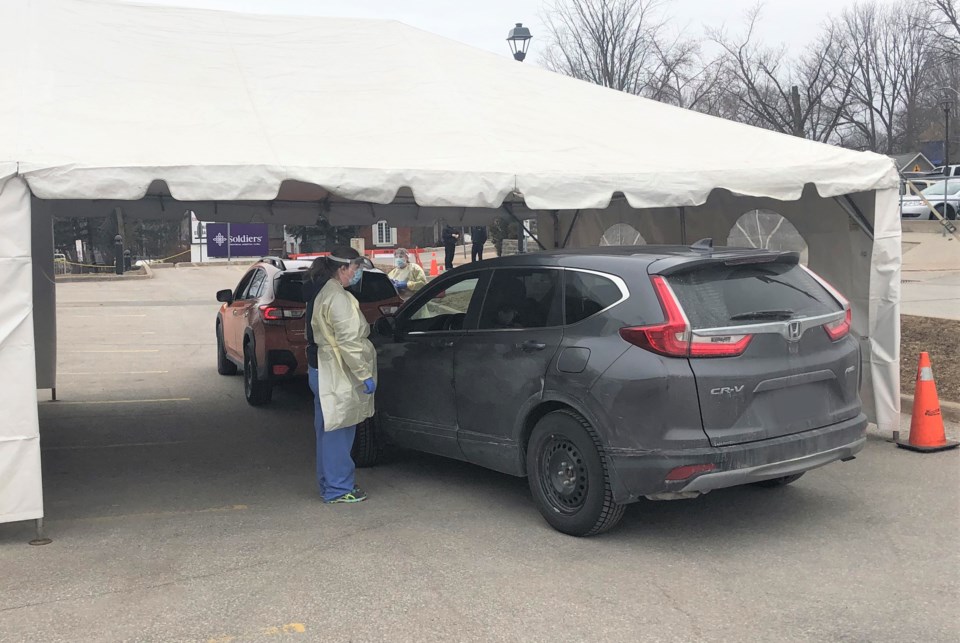An Orillia woman hospitalized at Orillia Soldiers’ Memorial Hospital is among four new COVID-19 cases in the region.
Investigation by the Simcoe Muskoka District Health Unit (SMDHU) concluded the woman, in her 70s, contracted the virus through community transmission.
Dr. Charles Gardner, medical officer of health for SMDHU, said her case could not be connected to any known positive cases and she had no travel history.
“We have been unable to determine how she acquired this infection,” said Gardner. “I’m troubled to see community-acquired cases … It’s entirely possible for us to go out into the community and get infected with this virus.”
Another case was confirmed today in a 52-year-old Adjala-Tosorontio man who recently returned from travel in the United States. He is hospitalized at Southlake Regional Health Centre.
There are two more cases Gardner said just arrived on his desk this afternoon and he could not confirm the ages, genders, locations, status, or method of transmission yet.
This marks the biggest jump in lab-confirmed cases in the region since the pandemic began.
“We’re definitely seeing the onset of community-acquired cases, and there’s a significant amount of severe cases,” said Gardner. “I’m troubled by the number of cases that are severe."
Without the two newest cases included, there are four people currently hospitalized for COVID-19 in the region, and two others have died.
Despite that, testing is currently only being done on people who have severe symptoms, those who have travelled and are showing symptoms, or close contacts of people who have travelled.
In lab-confirmed positive cases, the health unit will get a detailed history from the patient and/or a family member and they specifically ask for a date when they first experienced symptoms.
Gardner said the health unit will then ask for the patient’s whereabouts for 24 hours before the onset of symptoms and will follow up with the close contacts during that 24-hour period. Those contacts are asked to self-isolate for 14 days. They may or may not be tested.
Gardner said the 24-hour pre-symptom screening is a standard established by the province for the virus. However, it isn’t clear if someone infected with COVID-19 can spread the virus before symptoms begin or for how long before the onset of symptoms.
“We’re learning as we go, and these are the recommendations from the province to date,” said Gardner. “We’re hearing there is the potential for transmission before the onset of symptoms.”
Gardner said the demand on health unit staff to follow up with the cases is growing, and SMDHU has redeployed all staff, except for a few responsible for general public safety, to the COVID-19 response.
And while the caseload is growing at SMDHU, a large number of cases will go undetected, whether it’s because the person infected doesn’t qualify for a test, or because they don’t know they have the virus.
Gardner said the potential for people with mild or no symptoms to transmit the virus is high, as they are likely “shedding” the virus for eight days.
“You don’t know in the community who is presently shedding the virus and who is not,” he said.
He’s recommending anyone with symptoms self-isolate completely at home until 24 hours after they are symptom-free or for ten days, whichever is longer.
In the meantime, Gardner urges people to stay home and to stay a safe distance away from people.
He’s started switching his use of the term 'social-distancing' to 'physical distancing.'
“Isolation is hard on people,” said Gardner, adding the Canadian Mental Health Association has been reiterating the importance of social connection.
“People do need to use other means of being connected to each other,” he said, again adding caution for people to keep physical distance and use technological and other means to connect without touching.
“This is going to be a marathon,” said Gardner. “I think it will go on weeks to months and it may very well happen in waves.”
The SMDHU recommends remaining at home, even if you are not showing symptoms of the virus. You can call the province's Telehealth service or use the province’s online assessment tool to confirm your symptoms.
You should only report to a hospital assessment centre or emergency department if your symptoms become severe.
You can learn more about what to do if you suspect you have COVID-19 or are worried about contracting it on the SMDHU website.
Those returning from out of country should be self-isolating immediately for 14 days.
